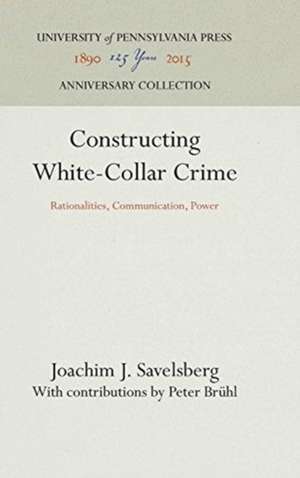Constructing White–Collar Crime – Rationalities, Communication, Power
Autor Joachim J. Savelsberg, Peter Brühlen Limba Engleză Hardback – 28 apr 1994
In Constructing White-Collar Crime, Joachim J. Savelsberg, a sociologist, and Peter Br hl, a lawyer, have provided an interdisciplinary case study of the construction of new German laws against white-collar crime, relating their results to internationally comparative findings. The analysis is empirical; it is theoretically grounded in a sociological approach that contrasts Marxist versus pluralist or differentiation theory, and functionalist versus conflict group or action theory. The authors also analyze their findings in relation to Max Weber's theory of rationalization of law. In addition the research is methodologically innovative, introducing the technique of cognitive mapping into the study of criminal justice legislation. The book represents the authors' attempts to bridge the gap between microsociological and macrosociological approaches to the construction of criminal law.
The authors analyze action rationales, communication patterns, and power structures as they play out in different stages of the law-making process: claims-making in news media; participation of scholars and practitioners in an expert commission and in parliamentary hearings; involvement of industrial lobbying groups during the drafting of the bill in the Department of Justice; and parliamentary deliberations. The analysis demonstrates the considerable weight of economic and political rationales as opposed to justice criteria in the development of criminal legislation. It also indicates that white-collar crime legislation may have counterproductive consequences. The laws are intended to increase the quality of criminal justice by criminalizing the behavior of the powerful, but the less powerful groups within the white-collar classes are more likely to feel the effects.
Constructing White-Collar Crime will be of interest to students and scholars in the areas of sociology, law, and criminology.
Preț: 496.18 lei
Preț vechi: 557.50 lei
-11% Nou
94.94€ • 99.14$ • 78.40£
Carte tipărită la comandă
Livrare economică 15-29 aprilie
Specificații
ISBN-10: 0812232402
Pagini: 200
Dimensiuni: 152 x 229 x 15 mm
Greutate: 0.46 kg
Editura: MT – University of Pennsylvania Press
Cuprins
Figures and Tables
Preface
PART I- WHY STUDY WHITE-COLLAR CRIME LEGISLATION?
Chapter 1- Questions, Introduction to the Case, and Overview
PART II- THEORY AND METHODS IN THE STUDY OF WHITE-COLLAR CRIME LEGISLATION
Chapter 2- Rationalities, Communication, and Power: Theoretical Perspectives and Methods
PART III- THE CASE STUDY: FROM CLAIMS MAKING TO LEGISLATION
Chapter 3- The Social Problem of Economic Crime, Claims Making, and Motivating the Political Process
Chapter 4- The Expert Commission: Developing the Claims and First Resistance
Chapter 5- The Production of the Second Law Against Economic Crime: The Political Sector
Chapter 6- Context Structures, Situations, and Argument Structures: The Total Set of Cognitive Maps
PART IV- CONCLUSIONS FROM THE CASE STUDY AND AN AMERICAN-GERMAN COMPARISON
Chapter 7- Rationalities, Communication, and Power: Conclusions
Chapter 8- The American and German Cases: Commonalities and Differences
References
Index
